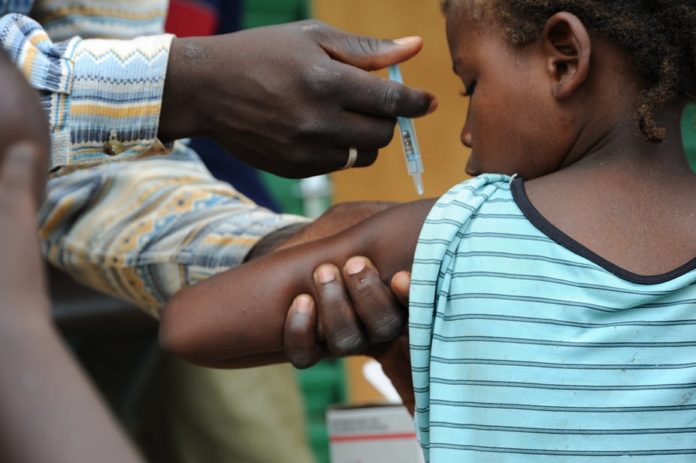|
Getting your Trinity Audio player ready...
|
Health authorities in Ghana’s Upper East Region have confirmed that an 80-year-old man from Tongo in the Talensi District of the Upper East Region died from Cerebro Spinal Meningitis (CSM).
Officials say the deceased died at the Regional Hospital in Bolgatanga, the Regional capital. Two others are receiving treatment for the same disease at the Hospital.
Dr Josephat Nyuzaghl, the Upper East Regional Deputy Director in charge of Public Health, who confirmed the death to the Ghana News Agency (GNA) on Tuesday after he led a team from his outfit to assess the situation, said “So far we have two cases that are currently on admission, unfortunately one passed on yesterday, an 80-year-old man and that was a confirmed case of meningitis.”
He disclosed that there was a 10 year-old girl referred from the Sandema District Hospital to the Regional Hospital on account of CSM, and was responding to treatment. “There was a third case, but that person was discharged yesterday,” he said.
“This morning we have two cases on admission, and I want to assure the general public that the information that a lot of people are dying from meningitis from the Regional Hospital is not true.”
Dr Nyuzaghl said “As a Region, we know that we are in the meningitis season and we have been preparing from the beginning of the year to put our house in order, so that we are in the position to respond if there is an outbreak.”
He said so far, no District had reached the alert phase of meningitis, and explained that “When we say alert, for a population of between 30,000 and 100,000 people, if you are seeing up to five cases per week, then you have reached the alert phase.”
The Deputy Director said ‘alert’ was to draw the attention of the health system to intervene, and emphasized that no District in the Region had reached that stage.
He said as part of preparations to handle any outbreak, the Ghana Health Service (GHS) in the Region had sent alerts to all Districts so that they would know the case definitions that would be used to identify CSM cases.
According to Dr Nyuzaghl, health professionals were also well prepared to take Cerebro Spinal fluid for laboratory investigations and confirmation, and said the GHS had created awareness in the media, and through sensitization programmes in various communities.
“We want people to know what the signs and symptoms are, so that if you have those symptoms, the first thing to do is to report to the health facility, so that you are assessed properly, and if indeed you have meningitis, the treatment can be initiated early”.
He entreated members of the public to sleep in well ventilated rooms, drink plenty water and report immediately to any health facility if they had severe headache, stiffness of neck, vomiting, muscle pain and fever among others.
High alert as Meningitis kills 3 in Ashanti Region
The Ashanti Region has also recorded an outbreak of meningitis.
The disease has so far claimed the lives of three people.
The deaths are among 15 suspected cases recorded in the Sekyere Central and the Mampong Municipality.
Six out of the 15 persons have since been tested negative of the disease while the others are being monitored, the Ashanti Regional Health Directorate told dailymailgh.com.
The outbreak of a variant of meningitis in the Brong Ahafo, Northern and Ashanti regions is causing public health concern among residents there.
Health officials who have been briefing journalists in the Ashanti regional capital, Kumasi about the outbreak have, however, dismissed suggestions the disease has reached an epidemic stage.
Deputy Ashanti Regional Health Director in charge of Public Health, Dr. Yaw Ofori Yeboah told dailymailgh that the Directorate is on top of the issues and is still putting in place measures to curb the outbreak.
“Fortunately six of them have turned out to be negative”, Dr Ofori Yeboah said. “And especially the conditions that we find ourselves; very tough harmattan, the weather is very dry and so these conditions promote meningitis and we are very concerned because it keeps on spreading”.
He urged the media to assist in public education campaigns as surveillance is intensified across the affected regions.
“One key thing is that meningitis is treatable and so anybody with the signs and symptoms should report to the nearest health center for medical attention”, the health director explained.
Vaccination is an effective way of preventing against meningitis.
The seasonal outbreak has been attributed to cold nights, dusty winds and dry weather, which were aggravated by traditional beliefs, poor hygiene, and overpopulation, our reporter says.
Ghana lies on the meningitis belt, stretching from the Sahel region to the Horn of Africa, where outbreaks occur regularly.
The country recorded two deaths in the Central Region earlier this month.
The victims were students from the Nyankomase Senior High School.
By Jonathan Ofori, Daily Mail GH | joevica18@gmail.com





